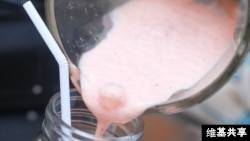tinydancer
Diamond Member
Well screw the wars, the earthquakes and floods being an indicator of end times.
You know it's time to break out Revelations when I can make a thread about Breast milk ice cream called are you ready? Baby Gaga.
And have my thread be in the same Food and Wine Forum as Natural Harvest Semen Recipes.

Okay, here's the scoop (pardon the pun).
Breast Milk Ice Cream Causes Hepatitis Fears In London
Updated: Tuesday, 01 Mar 2011, 9:44 AM EST
Published : Tuesday, 01 Mar 2011, 8:07 AM EST
By NewsCore - A London borough council confiscated breast milk ice cream being sold in a shop in the city's tourist district over fears it could contain hepatitis viruses and sent it for testing.
"Following two complaints from members of the public and concerns from the Health Protection Agency and Food Standards Agency, our officers visited the premises and removed all ice cream being sold as containing breast milk," council officer Brian Connell told the London Evening Standard newspaper Tuesday. "Selling foodstuffs made from another person's bodily fluids can lead to viruses being passed on and in this case, potentially hepatitis."
Now what I want to know is in this type of product recall how do the authorities determine what lot number might be the cause of contamination?



Breast Milk Ice Cream Causes Hepatitis Fears In London
You know it's time to break out Revelations when I can make a thread about Breast milk ice cream called are you ready? Baby Gaga.
And have my thread be in the same Food and Wine Forum as Natural Harvest Semen Recipes.

Okay, here's the scoop (pardon the pun).
Breast Milk Ice Cream Causes Hepatitis Fears In London
Updated: Tuesday, 01 Mar 2011, 9:44 AM EST
Published : Tuesday, 01 Mar 2011, 8:07 AM EST
By NewsCore - A London borough council confiscated breast milk ice cream being sold in a shop in the city's tourist district over fears it could contain hepatitis viruses and sent it for testing.
"Following two complaints from members of the public and concerns from the Health Protection Agency and Food Standards Agency, our officers visited the premises and removed all ice cream being sold as containing breast milk," council officer Brian Connell told the London Evening Standard newspaper Tuesday. "Selling foodstuffs made from another person's bodily fluids can lead to viruses being passed on and in this case, potentially hepatitis."
Now what I want to know is in this type of product recall how do the authorities determine what lot number might be the cause of contamination?



Breast Milk Ice Cream Causes Hepatitis Fears In London





